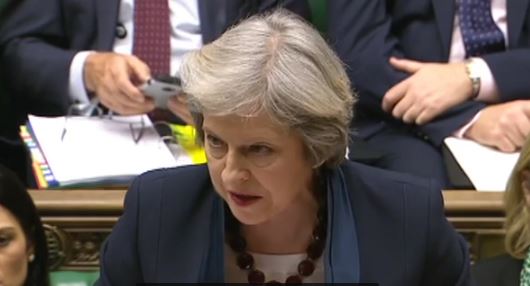Prime minister accused of being "in denial" about NHS crisis

Prime minister Theresa May has been accused of being "in denial" about a crisis in the National Health Service caused by huge demand and limited resources.
Many NHS hospitals are currently struggling to cope with a surge in demand, which has been caused by winter, but also a growing underlying growth in demand and cuts to funding.
Labour leader Jeremy Corbyn grilled May in yesterday's Prime Minister’s questions in Parliament, saying she was refusing to acknowledge a crisis in hospital A&E departments.
The Red Cross even went as far as calling it an 'humanitarian crisis' and called for better health and social care funding. It said 14 health trusts had warned of overcrowding in A&E units in the space of 24 hours, putting patients' lives at risk.
Much of the pressure on hospitals stems from delays discharging patients, who are fit to leave but cannot find the right care and are not supported at home, the charity said.
The Red Cross said it has already provided support to staff at the East Midlands Ambulance Service across Nottingham, Leicester, Lincoln, Kettering and Northampton.
When challenged on the claims by Corbyn, May acknowledged there were pressures on the NHS, particularly during winter and because of an ageing population.
But she added: "I think we've all seen humanitarian crises around the world and to use that description of a National Health Service which last year saw 2.5 million more people treated in accident and emergency than six years ago is irresponsible and overblown."
Corbyn noted that 1.8m people had to wait more than the government target of four hours last year in A&E departments, adding that the British Medical Association (BMA), Royal College of Nursing and Royal College of Physicians have all warned about conditions on NHS wards.
May responded by saying she continued to support the four-hour waiting target for A&E, but added: “It’s not just a question of targets for the health service. It is a question of ensuring people are provided with appropriate care for them and the best possible care for them in their circumstances.”
But Corbyn responded: “She seems to be in some degree of denial about this.”
Health secretary Jeremy Hunt earlier this week seemed to abandon the four-hour target, saying patients with minor injuries may have to wait longer.
In a response to May's comments, Dr Mark Porter, BMA council chair, said: “The government is wilfully ignoring the scale of the crisis in our NHS. Trying to play down the pressure that services are under shows the prime minister is out of touch with patients and frontline staff who are working flat out under impossible circumstances."
The issue also proved to be a talking point on Twitter, where doctors and critics of the government took aim at May’s government for failing to fund the NHS properly.
https://twitter.com/dr_alex_gates/status/817792062351437825
With several cold months still to come, the pressure on the NHS, and the bitter row over its finances, looks set to continue.
Meanwhile, NHS England's chief executive Simon Stevens was also in Westminster yesterday, giving evidence to a Commons committee, and seemed to contradict government claims that the NHS was receiving more money than it had requested.
Ministers said that NHS England had asked for £8bn and had been allocated £10 bn - however Stevens said this disparity was because the larger sum covered six years rather than five years.
Appearing before the Public Accounts Committee, Stevens stressed the pressures on the NHS.
"Over the next three years funding is going to be highly constrained and in 2018-19, as I've previously said in October, real-terms NHS spending per person in England is going to go down, 10 years after Lehman Brothers and austerity began.
"We all understand why that is, but let's not pretend that that's not placing huge pressure on the service."












